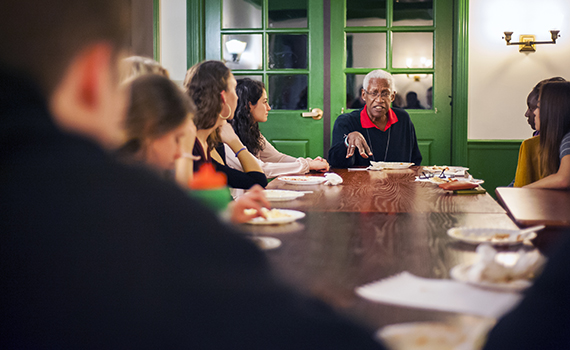
Robert Fullilove ’66, associate dean for community and minority affairs at Columbia University’s Mailman School of Public Health, speaks to students. Photo by Ashlee Eve ’14
A charismatic and larger-than-life personality, Robert Fullilove ’66 visited campus Friday to talk to students about his work in minority health and STD and HIV prevention.
At Columbia University’s Mailman School of Public Health, he is the associate dean for community and minority affairs, professor of clinical sociomedical sciences, and the co-director of the Community Research Group.
During a breakfast and brown bag discussion, Fullilove spoke to students who might be interested in the public health field.
Fullilove spoke about the disparities surrounding the incidence of HIV/AIDS in black and Latino communities. Much of his work has centered around examining how this disease suddenly “became a scourge in poor communities in the United States,” he said.
In understanding how this epidemic affects communities differently, Fullilove discredited the idea that the disease is linked to a biological condition like race rather than to social conditions like poverty.
“Trying to understand how a behavioral epidemic was being driven by biology made no sense,” said the widely published author. “It made more sense to look at the ways in which HIV/AIDS is affecting communities.”
Danielle Bynoe ’14 was inspired to invite Fullilove to campus after reading his work in Professor Jun Yoshino’s Core AIDS course.
From this initial interest, she was able to find support and funding to bring Fullilove to campus through ALANA, ALST, Brothers, the biology department, the Lampert Institute, and the Wellness Center, among others.
Fullilove told students that the skills he gained at şÚÁĎÍř and his ability to think critically were what helped him succeed in many different fields.
Bynoe believes that his wide range of knowledge makes Fullilove’s experiences relatable to all students, not only those interested in a health sciences track.
“Dr. Fullilove majored in philosophy and religion, yet ended up becoming exceptionally accomplished in public health. This truly speaks to the benefits of attending a liberal arts college,” she noted.